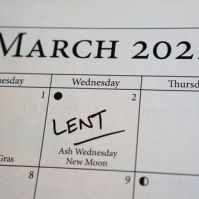 Most spiritual communities have feasts of some kind. It is a common part of humanity to want to celebrate joyous occasions. Merriam-Webster defines feast as "an elaborate and usually abundant meal often accompanied by a ceremony or entertainment" or simply "something that gives unusual or abundant enjoyment."
Most spiritual communities have feasts of some kind. It is a common part of humanity to want to celebrate joyous occasions. Merriam-Webster defines feast as "an elaborate and usually abundant meal often accompanied by a ceremony or entertainment" or simply "something that gives unusual or abundant enjoyment."
Liturgical Christians recognize many official feast days throughout the year, and for many congregations, Eastertide is one long feast, starting at the end of Lent and lasting for 50 days. Does this mean that you should have champagne with brunch every day of Easter? While some may agree this is a great idea, there are many different ways you can celebrate whatever feasts your tradition observes.
A Big Meal
When you tell your members you have a feast day, food is likely the first image that comes to mind. They may immediately start planning what they can bring to the potluck or looking for the sign-up sheets that ensure that seven different people don't bring green beans. This expectation is in line with most spiritual traditions. Gathering to celebrate almost always means a party, and what's a party without food?
Most communities also tend to want to encourage moderation, and this can seem contradictory to the notion of feasting. A large meal doesn't necessarily indicate temperance and restraint. Many churches resolve this issue by encouraging members to fast before the big day. It's no mistake that Easter is preceded by 40 days of simpler choices. In the end, the church hopes that the two will balance each other out so that members can experience both compassion for those who lack and the joy of abundant life.
Meaningful Teaching
Specific feast days often exist for particular reasons. When this is the case, the spiritual leaders in your community probably have clear texts that they can explore with members. Three conditions are often expected when these special teachings take place:
- Approach with curiosity. The congregation is not just a collection of empty vessels into which preachers pour knowledge. The time building up to the feast day is typically used to create a sense of expectation that they are going to learn something new. This practice is designed to have the same effect on the mind as fasting has on the body.
- Listen with an open mind. It is common for members to assume they know what the preacher is going to say on certain days. This is particularly true of those who have been in church for most of their lives. An astute pastor, however, may use feast days to stir up a complacent congregation and issue new challenges.
- Seek the next step. The goal of any great teaching is to spur people to action. Members should listen for details about how to apply the lesson to their own lives as they celebrate.
Fun Activities
A feast is more than just great food and meaningful conversation. There is usually some activity to commemorate the occasion as well. There are a lot of choices, but the best ones are those that illustrate the theme of the day.
Many churches host an Easter-egg hunt for the children during or after the celebration meal. While the egg is meant to symbolize new life in Christ, it also serves to tie the church back to some of its pagan roots. While many conservative congregations may balk at this concept, when embraced intentionally, it can be used to signal an openness to welcome all are looking for a God who loves them into the community.
Feasting conjures up a picture of a banquet table filled with delights, but it's not all about the food. Special lessons and activities make feast days more meaningful and help the youngest to the oldest members celebrate more thoroughly.



